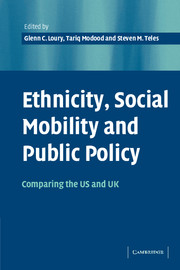Book contents
- Frontmatter
- Contents
- List of figures
- List of tables
- List of contributors
- Acknowledgements
- Introduction
- Part I Historical overviews
- Part II Informal social networks
- Part III Formal structures
- Part IV Political institutions and processes
- 16 Ethnicity and political mobilization in Britain
- 17 Political institutions and minority mobility in the USA
- 18 Race, state, and policy: the development of employment discrimination policy in the USA and Britain
- 19 Regime effects: ethnicity, social mobility, and public policy in the USA and Britain
- Part V Normative analysis
- Author index
- Subject index
- References
18 - Race, state, and policy: the development of employment discrimination policy in the USA and Britain
Published online by Cambridge University Press: 22 September 2009
- Frontmatter
- Contents
- List of figures
- List of tables
- List of contributors
- Acknowledgements
- Introduction
- Part I Historical overviews
- Part II Informal social networks
- Part III Formal structures
- Part IV Political institutions and processes
- 16 Ethnicity and political mobilization in Britain
- 17 Political institutions and minority mobility in the USA
- 18 Race, state, and policy: the development of employment discrimination policy in the USA and Britain
- 19 Regime effects: ethnicity, social mobility, and public policy in the USA and Britain
- Part V Normative analysis
- Author index
- Subject index
- References
Summary
Long a central feature of American politics, racial diversity increasingly emerged as a critical dividing line in British politics as well in the last half of the twentieth century. Despite its imagery of homogeneity, Britain's national identity and political development have long been infused by racial and ethnic constructs (Curtin 1964, Colley 1992, Hickman 1998). In the wake of the British Empire's dissolution, immigration from former colonies in Asia, Africa, and the Caribbean has heightened the prominence of racial diversity in Britain and spawned a familiar litany of problems: racism, discrimination, political powerlessness, and violence. In the United States, these are the common disorders of a society that has long been divided by race, in particular by the color line between African-Americans and all others (Smith 1997, Jacobson 1998, Lieberman 1998, Marx 1998). In Britain, however, postwar immigration produced new patterns of race politics that redrew the racial and ethnic lines that had come to prevail in British society (Paul 1997, Hansen 2000, Hickman, this volume).
Despite differences in the way national “color lines” are drawn, racial diversity poses similar policy problems in the two countries, encompassing particularly issues of state protection against discrimination in a variety of domains. Moreover, the United States and Britain share a common ideological and cultural approach toward defining race as a political category and framing issues of race policy.
- Type
- Chapter
- Information
- Ethnicity, Social Mobility, and Public PolicyComparing the USA and UK, pp. 498 - 521Publisher: Cambridge University PressPrint publication year: 2005
References
- 3
- Cited by



